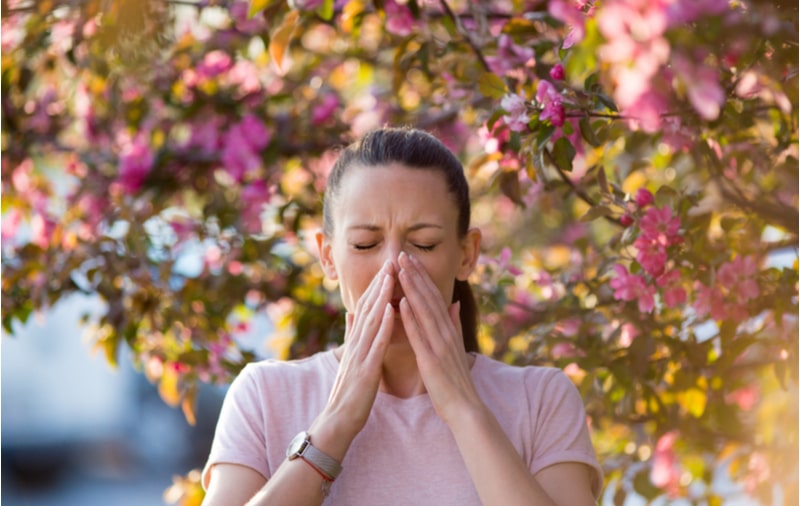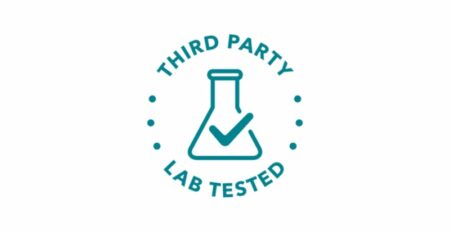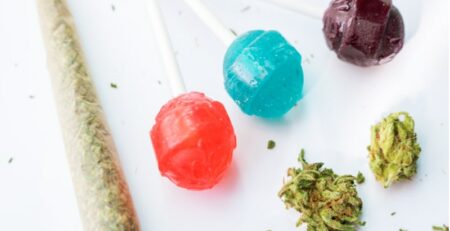Can CBD Help My Hayfever?
Summer is finally here! Outdoor parties, seaside swimming, lounging in the sun, working up a tan. But for us hay fever sufferers, we know it’s not all fun and games. Not a truer sentence has been spoken, and I can say so for myself.
Hay fever has ruined many summer plans for myself and other hay fever endurers alike. You wake up with good intentions only to realise you can barely open your eyes. Yep, you have a stinging waterfall streaming down your cheeks. Your nose might be a constant drip, or sneezing like you’re trying to wake the whole house up.
Not to mention the fact that your skin decides to itch and tingle, making it difficult to sit still. You may forget about makeup, too, if that’s usually your groove. Doesn’t exactly sound like a hot girl summer mood, does it?
I’ve tried everything from antihistamines, nasal sprays, to eye drops. I’ve even held an ice pack to my swollen eyes (I was desperate, okay?). And yet, nothing seems to really do the job when the pollen count is at its worst.
So what can be done? It’s time to take matters into my own hands.
Can CBD Help Combat My Allergies Symptoms, and Yours Too?
Allergies caused by pollen, dust mites, hives, or bug bites can be treated with antihistamines. Our body’s release histamine when it finds these elements to be harmful. Then, blood vessels swell to protect itself and antihistamines try to block this reaction.
Sometimes, Corticosteroids are used as a medical solution to treat hay fever either orally or in nasal sprays. They reduce congestion caused by the inflammation in your nose as a result of these pollen particles and similar allergies.
However, many hay fever sufferers dislike these conventional drugs (myself included) as they can cause some pretty disappointing side effects, such as tiredness and weight gain. Not to mention the uncomfortable drowsy feeling of some antihistamines. While non-drowsy sometimes tends to not work all that well, at least in my case.
Luckily, we may be able to try out some herbal remedies to finally give us some peace (insert image of rebelliously burning packets of Kleenex tissues).
You may have heard CBD popping up everywhere as a sort of a buzz word in the healthcare and skincare world. Many will report it has very promising results for a number of health and skin related issues.
You can find CBD in the form of oils, tinctures, and capsules. Or, enjoy edible versions with CBD-infused food such as gummies, cookies, lollipops, and bars. Personally, I’ve tried CBD tincture and I loved the effect it had on my overall mood.
However, this was some time ago and for a completely unrelated issue, and definitely not during allergy season. So, had I ever considered trying CBD for hay fever? At this stage, I’ll try anything. But let’s look into it.
What CBD and Allergies Research Has Been Done?
It’s true, not too much research has been done into CBD and its effects on hay fever sufferers to date. This is due to the extensive ongoing discoveries of all the ways in which CBD can help humans, as new findings are appearing each year. Hay fever may be a little low on the list of important tests.
But one thing for certain are the anti-inflammatory properties CBD is known to have and how, in general, CBD is considered an immunosuppressive. This could be great news for the suppression of hay fever symptoms.
Inflammation of the nose, eyes, and throat happens as a result of pollen entering the facial area and triggering an allergic reaction, as the sinuses swell to protect themselves. CBD can combat this due to its promising effects on the human endocannabinoid system (ECS).
The endocannabinoid system is found in the human body and performs as endocannabinoids, that act as neurotransmitters binding to cannabinoid receptors (CBRs).
Essentially, the relationship between the effect of CBD and these cannabinoids is positive in the way that they interact with important receptors linked to the ECS that controls our bodies perception of pain.
CBD as an Anti-Inflammatory Solution
A recent study shows twenty volunteers, including 14 females and 6 males between 20 and 80 years of age, partake in a study for CBS’s anti-inflammatory properties against skin diseases, such as eczema and psoriasis. By using a topical CBD ointment, the effects of CBD on these patients showed evidence of the reduction in blemishes, scars, and papules that the volunteers were suffering with.
What we can take from this is that CBD can significantly help with painful swelling. It makes you wonder about swelling that occurs due to allergies.
Furthermore, under the same logic, if we were to ingest CBD through an edible form, we may reduce the symptoms we experience from hay fever to bring ourselves a little calmer during the hot weather such as itching, irritability, and stress.
While CBD cannot eradicate our body’s response to pollen by releasing histamine, CBD may provide anti-inflammatory properties to target our throat, eyes, and nose when histamine does its worst.
From my research, it seems that CBD’s relationship to hay fever is still a debatable subject. However, from learning about CBD’s effect on our body’s inflammation, I think it’s safe to say I’ll give it a try.
How to Use CBD for Hay Fever Symptoms
Luckily for us hay fever sufferers, we have many different CBD products to choose from. CBD Village stocks a large array of products from various brands to get the ball rolling.
From looking at the website I’ve compiled a couple of my personal favourites that could be a nice comfort during stressful pollen attacks.
CBD Tea for Allergies
Canndid English Breakfast CBD Tea Bags is the perfect option to try CBD for hay fever. First of all, no one forgets their morning brew, and taking your CBD early in the day will help you monitor the affect it has on your allergy symptoms.
Used just like regular tea, these tea bags should be a daily treat. Better yet, pop some tea bags into your bag and take them to work for a quick brew on your break, no questions asked. This way you can focus on your task at hand and hopefully forget about your allergies.
If you like a little more flavour in your tea, Canndid stocks five other ranges including lemon and ginger, apple and elderflower, rose and green CBD tea, peppermint, and chamomile.
If hay fever tends to strike you down more at nighttime, then chamomile could be an even better option to try.
Other CBD drinks include some CBD sparkling drinks or CBD water. These could be specifically great to test out for hay fever while keeping ourselves hydrated during hot summer days. Easy to take around with you, and makes relaxing in the park (hopefully) more enjoyable.
CBD Balm for Allergies
Poko’s Recovery Cooling Balm may be our saving grace for anti-inflammatory properties. Intended to cool down skin that is hot and flushed due to various reasons such as common skin conditions, tired muscles and painful skin.
From personal experience, my skin flares up regularly due to constant itching from pollen. Poko’s Cooling Balm contains soothing menthol and CBD that may be exactly what I need (so I can throw out the ice pack).
Word of warning, however, this balm isn’t intended for use on the eyes, nose, or mouth. Stick to a balm for other areas of the skin. Use a gentle approach around the nose and sinus areas by trying petroleum jelly for soothing and protection.
Can I Take CBD and Antihistamines Together?
Again, more research on this topic is underway, and the relationship between CBD and other medications is continually being studied. Because we are unsure, it may be important to consider only taking one or the other for now. This is especially true if you are new to taking CBD and do not yet know how your body will react to it.
Antihistamines are a specific type of medicine that affects our metabolism and may interfere with how CBD is ingested through the body. Meaning, we may not be able to monitor how CBD is being released into the body if taken with antihistamines. As we can feel drowsy with this hay fever medication, it’s not the best idea to add CBD on top of that.
Furthermore, some antihistamines can contain a grapefruit label warning.
A grapefruit label refers to certain medications that should not be taken in conjunction with eating grapefruit or drinking grapefruit juice. This is due to the fact that grapefruit affects the proteins that break down medications present in your small intestine and liver. This can lead to higher levels of the drug in your bloodstream and can cause unwanted side effects.
Therefore, it’s important to know if your medications contain this label (you should be able to find it on the box). As research is ongoing, the same logic may apply to the ingestion of CBD in conjunction with grapefruit.
It’s best to consult with your doctor or pharmacist if you are at all unsure and take things slowly.
However, if you are using CBD topically through a balm or cream you should be good to go. This is because they will target only a specific area of skin, and isn’t ingested through the small intestine or liver.
Ready to Give It a Try?
Feeling uncomfortable, irritable, and downright miserable from seasonal allergies is something I can truly relate to. If, like me, you have ever wondered about the possibilities of CBD and hay fever as a match, then I hope we have come out of this feeling a little more informed.
So, does CBD help hay fever? We’ve learned that CBD can help our symptoms of hay fever which is a positive discovery, but it does not have a direct effect on our body’s reaction to pollen and release of histamine. Essentially, CBD can be seen as an anti-inflammatory but not an exact antihistamine in itself.
There are, of course, some points to also remember.
CBD could work wonders for us allergy sufferers but we should take care not to overindulge our bodies in too many substances. We should pay particular attention to antihistamines with CBD. I am hopeful that more research will become available as the CBD industry continues to grow.
If anything else, I am ready and willing to try CBD for hay fever.





